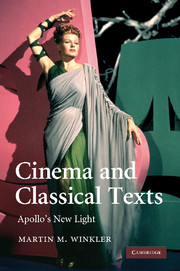Book contents
- Frontmatter
- Contents
- List of illustrations
- Acknowledgments
- ΦΟΙΒΩΙ ΑΠΟΛΛΩΝΙ ΦΩΤΟΚΙΝΗΤΗΙ
- Introduction: The god of light and the cinema eye
- 1 A certain tendency in classical philology
- 2 Divine epiphanies: Apollo and the Muses
- 3 The complexities of Oedipus
- 4 Patriotism and war: “Sweet and fitting it is to die for one's country”
- 5 Helen of Troy: Marriage and adultery according to Hollywood
- 6 Women in love
- Epilogue: “Bright shines the light”
- Bibliography
- Index
2 - Divine epiphanies: Apollo and the Muses
Published online by Cambridge University Press: 18 August 2009
- Frontmatter
- Contents
- List of illustrations
- Acknowledgments
- ΦΟΙΒΩΙ ΑΠΟΛΛΩΝΙ ΦΩΤΟΚΙΝΗΤΗΙ
- Introduction: The god of light and the cinema eye
- 1 A certain tendency in classical philology
- 2 Divine epiphanies: Apollo and the Muses
- 3 The complexities of Oedipus
- 4 Patriotism and war: “Sweet and fitting it is to die for one's country”
- 5 Helen of Troy: Marriage and adultery according to Hollywood
- 6 Women in love
- Epilogue: “Bright shines the light”
- Bibliography
- Index
Summary
Filmic representations of classical texts are adaptations either set in Greece or Rome or updated to modern times, or they are modern stories in which figures from ancient history, literature, or myth play a part. Most of the films deviate from or contradict our sources, for they are highly inventive rather than faithful, authentic, or accurate. This phenomenon goes back to the earliest days of cinema, which has made possible the greatest variety in modern resurrections of ancient literature, especially myth. As representative and at the same time thematically focused examples of filmmakers' approaches to ancient myth this chapter examines the screen appearances of Apollo and the Muses, whom we encounter both in artistically significant films and in crassly commercial products. The very differences between and among these films make a comprehensive enquiry rewarding.
My intentions in this chapter are twofold. The first is to demonstrate the validity of the neo-mythological approach outlined in my Introduction. I have therefore chosen as a test case the subject of Apollo and the Muses, a topic that is especially suitable because it remains manageable for the purpose of such an enquiry (and because, as we have already seen and will see again, the god of light is also the god of cinema). The films involved are few enough to make a reasonably complete survey possible.
- Type
- Chapter
- Information
- Cinema and Classical TextsApollo's New Light, pp. 70 - 121Publisher: Cambridge University PressPrint publication year: 2009



